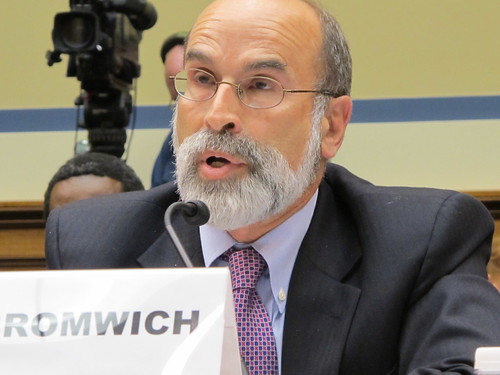On the Hill, Gulf Oil Drilling Safety Takes a Back Seat
When members of Congress want to figure out what’s really going on in the Gulf these days, it’s easy to tell if they just want to make political statements or get to the truth of the matter.
This week political statements ruled the day. Rep Darrell Issa (R-CA), chairman of the House Committee on Oversight and Government Reform, turned tradition on its head by first trotting out Gulf politicians and businessmen intent on bashing Obama administration oil drilling policies. The man responsible for ensuring drilling safety was allowed to speak---last.
The hearing, “Making the Gulf Coast Whole Again; Assessing the Recovery Efforts of BP and the Obama Administration after the Oil Spill.,” could instead have been called “Making the Oil Industry Whole Again; How the Obama Administration Put Safety Before Profits.” For an indication of the thrust of the hearing, check out the Media Matters report here.
Mississippi Gov. Haley Barbour was the lead witness and he didn’t disappoint. The former energy industry lobbyist made it clear where his priorities were, telling the committee this was an “economic disaster not an environmental one.” The governor even blamed the media for making oil-coated wildlife look like “chocolate pelicans.” And Barbour emphatically told the panel all seafood testing so far has found to be safe while the beaches of Mississippi are all clean and clear.

Gov. Barbour at House oversight hearing Photo: Rocky Kistner/NRDC
That’s not exactly what some people are reporting in the Gulf. Turtles and dolphins and a plethora of dead animals and fish have been washing up in high numbers on Mississippi beaches. Red Snapper with lesions are being found by scientists off the Gulf Coast with bacterial infections that could be harmful to humans. And my NRDC colleagues Gina Solomon and Miriam Rotkin-Ellman have repeatedly blogged about the serious deficiencies in government seafood testing programs.
But Barbour raised eyebrows when he insisted that a massive accident the size of the Deep Water Horizon blowout was worth the risk of drilling more than 30,000 oil wells in the Gulf so far. “The risk of 1 in 31,000 is worth taking when you’re talking about something that’s so important to the economy of the United States of America.”
When Rep William Lacy Clay asked if this was a dangerous policy, Barbour swatted that aside. “The industry tries to prevent accidents and protect people because it’s expensive when they don’t…I’m against excessive regulation.”
But Barbour’s risk taking wasn’t very reassuring to the last person to speak, Michael R. Bromwich, Director of the Bureau of Ocean Energy Management, Regulation and Enforcement. Bromwich pointed out that the bi-partisan presidential oil spill commission had reported 79 serious loss of well control incidents in the Gulf since 1996.
Another way to describe that is 79 near misses, 79 almost Deep Water Horizons….to say the risk was one in a million or one in X thousand of deep water wells drilled is not accurate. Now we will never be able to reduce the risk to zero, We know that and you know that. But we have to work constructively to try to diminish those risks in a balanced way so we don’t impose inappropriate high costs on industry and yet we do raise the bar on safety. We’ve done that.
As lawmakers bombarded Bromwich with questions about the economic impacts of his new safety rules regulations, one stood out from the pack. Rep Frank Guinta (R-NH) asked Bromwich if the safety agency considered loss of economic activity as part of its drilling permitting process. An incredulous Bromwich responded, “I don’t think it would be appropriate for them to scrutinize plan and permit application for any other reason to determine whether they are complying with the applicable regulations.”

BOEMRE Director Bromwich at hearing Photo: Rocky Kistner/NRDC
Safety concerns also seemed less important to Chairman Issa, who singled out operators of the Deepwater Horizon as industry bad actors behaving like a “drunken sailor.” But Bromwich countered that this was far from an isolated oil industry problem but a systemic one, as the presidential oil commission pointed out, and that the BP’s partners Halliburton and Transocean also provide support services for many rigs across the Gulf. NRDC President and presidential oil spill commissioner Frances Beinecke also hammered that home in this blog.
Perhaps angered that he couldn’t penetrate the steely armor of the BOEMR director, Issa tried one last probe, attacking NRDC as a “radical organization” for suing the government.
Issa: …The question for the Department of the Interior is, if you settle one more time with a radical environmental group that sues and then gets settlements leading to regulatory changes or areas off limits, don’t you have a conflict of interest?...
Bromwich: First of all, I think the characterization of NRDC as a radical environmental organization….
Issa: They sue…
Bromwich: …is not accurate. But secondly, we have to make litigation judgments, the Solicitor’s office has to make litigation judgments about whether to settle cases or not. Without going into details of settlement discussions, there are settlement discussions ongoing and I will tell you that one of the goals of such settlement discussions is to prevent more radical injunctions or actions being taken by the court…
This was one moment I felt proud sitting in a hallowed hearing room of Congress. Despite objections from a lawmaker, a senior government official was defending the rights of organizations to force federal agencies to comply with their own regulations.
Now that’s a radical concept.
